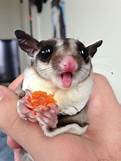Are Sugar Gliders Good Pets? What You Need to Know
Sugar gliders are small, adorable marsupials that have become increasingly popular as pets in recent years. They are known for their big eyes, soft fur, and playful personalities, but are they really good pets?

Sugar Glider Care Basics
Sugar gliders have unique care requirements that potential owners need to be aware of before bringing one home. These include:
- Diet: Sugar gliders are omnivores and eat a variety of foods, including fruits, vegetables, insects, and small animals. Their diet must be carefully balanced in order to meet their nutritional needs.
- Housing: Sugar gliders need a spacious enclosure with plenty of room to climb and play. The cage should also have a variety of toys and perches to keep them entertained.
- Socialization: Sugar gliders are social animals and should not be kept alone. They need regular interaction with their human caregivers and other sugar gliders in order to thrive.
- Exercise: Sugar gliders are active creatures and they need plenty of exercise to stay healthy. They should have access to a wheel or other type of exercise equipment.
- Grooming: Sugar gliders need to be groomed regularly to keep their fur clean and healthy. This includes brushing their fur, trimming their nails, and cleaning their ears.
Pros of Owning a Sugar Glider
There are several benefits to owning a sugar glider, including:
- Companionship: Sugar gliders can be very affectionate and loving pets. They enjoy interacting with their owners and can provide companionship for many years.
- Playfulness: Sugar gliders are very playful creatures and they love to play games. They can be entertained for hours with simple toys and activities.
- Intelligence: Sugar gliders are intelligent animals and they can learn tricks and solve puzzles. This makes them a challenging and rewarding pet to own.
Cons of Owning a Sugar Glider
There are also some challenges to owning a sugar glider, including:
- Nocturnal: Sugar gliders are nocturnal animals, which means they are active at night and sleep during the day. This can be inconvenient for owners who want to interact with their pets during the day.
- Messy: Sugar gliders can be messy pets. They tend to scatter food and droppings around their cage, and they may also chew on furniture and other objects.
- Expensive: Sugar gliders can be expensive to care for. Their initial purchase price can be high, and they require a variety of specialized supplies, such as a large cage, a special diet, and toys.
Conclusion
Sugar gliders can make wonderful pets for people who are willing to provide them with the care and attention they need. However, it is important to be aware of the challenges of owning a sugar glider before making a decision.
Declaration: All article resources on this website, unless otherwise specified or labeled, are collected from online resources. If the content on this website infringes on the legitimate rights and interests of the original author, you can contact this website to delete it.


